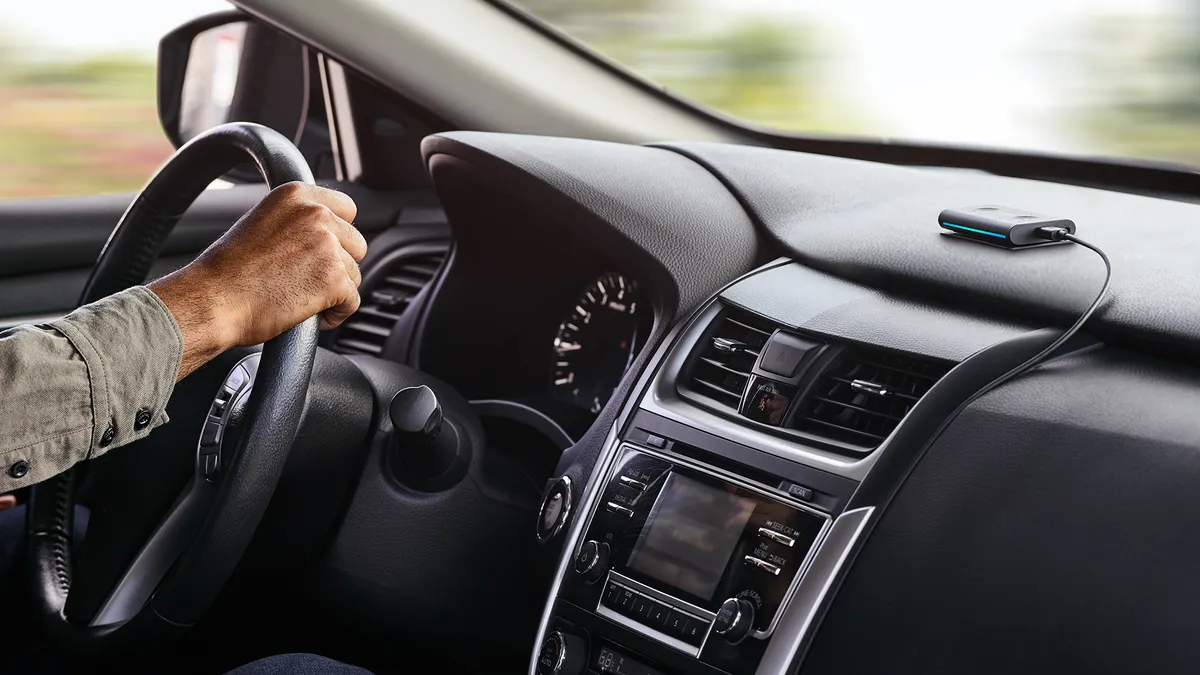Dive Brief:
-
The average 51 minutes that 135 million U.S. workers spend in their cars during their daily commutes represents a $230 billion in-car connected commerce opportunity through mobile smartphone or dashboard-based internet connections, according to the new Digital Drive study from PYMNTS.com and P97 Networks.
-
About 73% of 5,000 car commuters surveyed last month said they already connect to the internet while driving, translating to about 99 million connected commuters. The 73% is up from just over 66% a year ago, the study stated.
-
Separately, Amazon has started shipping its Echo Auto device, the in-car dashboard-mounted smart speaker with Alexa voice assistant capabilities that it first announced last September, according to a TechCrunch report.
Dive Insight:
Many parties — automakers, marketers, retailers, media companies and others — have been closely watching the movement toward in-car commerce, and many feel it's going to be a huge opportunity, but there remain enough uncertainties that parties involved are still being cautious.
One of the uncertainties has to do with how drivers and passengers will connect to the internet for in-car commerce. Will it be via smartphones and other personal mobile devices, or through dedicated "connected car" systems?
This study suggests that the majority of commuters — 56.3% of those surveyed, to be exact — who connect to the internet during their car commutes prefer to do so through mobile devices. The reality is that many dedicated connected car systems remain a work in progress and are found only on car models from recent years, and not the vast number of older cars that are still on the road.
That said, change is beginning to happen. This survey found that 16.7% of commuters now connect through in-dashboard systems, up from about 11.4% last year. That number should only grow larger, though getting consumers to buy connected cars and getting them to use those in-car connected systems for commerce are two different challenges.
In-car connected commerce likely will evolve as one of many ways in which voice commerce is carried out. Though voice commerce remains a very small subset of online commerce and the overall retail market, in-car commerce may present a market opportunity that could help consumers grow more comfortable with the notion of voice-driven purchasing, and fuel broader growth in overall voice commerce.
Because Google Assistant is on so many smartphones, Google is well positioned to be the lead enabler of in-car, voice-driven commerce. But, there is at least one other giant company with the name, resources and innovation energy to further stoke the market fires.
Amazon is trying to make a difference in this market with the Echo Auto, a new Echo device it announced last fall. The Echo Auto may split the difference between smartphones and dedicated in-car systems as a dedicated in-car device that connects through a smartphone. The addition of another device to this market could create more uncertainty, but it's also possible that Amazon's market entrance could be a game changer, as it has been in so many other segments.
TechCrunch reported that Amazon had more than 1 million pre-orders for the Echo Auto before it recently started shipping, and the new device supports and encourages the hands-free voice-powered capabilities that are so important to making this market successful. However, Amazon has not said much yet about using Echo Auto for shopping. Expect that to change soon.















